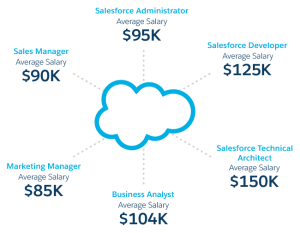
- Salesforce Careers
Reams have been written about the tight U.S. labor market but nowhere is the market tighter than in Salesforce careers. In 2017, an IDC white paper sponsored by Salesforce predicted that “3.3 Million New Jobs and $859 Billion New Business Revenue to Be Created from 2016 to 2022.” Additionally, a Burning Glass report claims that the demand for big data and analytics talent is skyrocketing. This competition will lead to increased salaries and benefits packages to acquire and retain the best talent. And it won’t be just the traditional developer and admin roles seeing the benefit as this graphic from Salesforce shows.

So how do you snag the best talent in this kind of environment. Even more pressing, how do you keep your best talent from jumping ship to a firm with deeper pockets or a better set of perks?
Here are 4 things to consider when hiring and retaining Salesforce talent
Hiring Salesforce Talent
#1: Understand that the Salesforce ecosystem is as broad as it is wide
Salesforce has become the world’s #1 CRM because of its flexibility and ease of use. Customers have used it for all sorts of tasks from simply monitoring sales leads to printing edible photos on cookies (seriously). Yet many companies don’t even scratch the surface of what it can do. This means many managers assume that one “Salesforce person” can do it all. That’s the same as asking one flight engineer with expertise in booster rockets to build, launch, fly and land the space shuttle. If you want to attract and retain the best Salesforce talent, understand the difference between the various roles and specializations in the Salesforce ecosystem and how they might each benefit your business.
#2: Badges? You need a lot more than stinking badges!
A great thing for users about Salesforce is all the free training offered by Salesforce called Trailheads. A bad thing for recruiting managers about Salesforce is all the free training offered by Salesforce called Trailhead. This means literally anyone can earn badges and work toward certifications with little to no real Salesforce experience.
When you are hiring Salesforce talent be sure to look beyond certifications, badges, etc. and dig into the candidate’s overall experience with Salesforce as a platform. Have they worked on projects similar to what you want them to do? Have they worked with firms in your industry? Reviewing a candidate’s Trailhead profile will shed more light on their experience, but a great Salesforce recruiter, like VALiNTRY360, will be able to use our own experience with Salesforce to pre-screen candidates and ensure they truly have the skills you need for your Salesforce roles.
Retaining Salesforce Staff
#3: Foster a thirst for knowledge
A team that has a growth mentality for your business likely has a growth mentality for their own careers. Foster that mentality by helping them create and grow their Salesforce certification portfolio. Companies do this by allotting time for employees to study for certification exams and many pay for the exams themselves. Some firms even tie an employee’s compensation to the achievement of such certifications. A broader way to build team skills is to encourage the group find a book many are interested in and discussing it together like an old school book club. This allows new ideas to enter the company mindset and leverages the entire team to determine how to best fold the concepts into the reality of your business.
#3: Foster a thirst for knowledge
A team that has a growth mentality for your business likely has a growth mentality for their own careers. Foster that mentality by helping them create and grow their Salesforce certification portfolio. Companies do this by allotting time for employees to study for certification exams and many pay for the exams themselves. Some firms even tie an employee’s compensation to the achievement of such certifications. A broader way to build team skills is to encourage the group find a book many are interested in and discussing it together like an old school book club. This allows new ideas to enter the company mindset and leverages the entire team to determine how to best fold the concepts into the reality of your business.
#4: Care about what your employees care about
Increasingly, employees see their workplace and colleagues as part of their tribe as opposed to a random collection of people. This collective mentality means that, as a manager, you need to ensure that the workplace and the culture represent the team’s shared values. To do this, you should create ways for employees to express their desires around making an impact on society. Then leverage that feedback to develop programs that engage the team around those issues. Examples could be creating initiatives and opportunities for volunteerism, office recycling or employee wellness among others. Or perhaps the team just wants good coffee and standing desks. The key is letting the team drive the conversation and advise management on the best use of resources. For an example of how this is done well on a large scale, check out Salesforce’s Ohana initiative.
Ready to get started? Contact us to learn more about how VALiNTRY360’s staffing services can help you hire and retain the best Salesforce talent.
Related Posts
- Salesforce Careers
VALiNTRY360 Ready to Deploy New Salesforce® Features
WINTER PARK, Fla., December 4, 2020 –VALiNTRY360, a digital transformation company and Salesforce Silver Consulting Partner, is proud to announce that it will begin implementing and rolling out the new services announced by Salesforce during the 2020 Dreamforce Keynote earlier…
- Salesforce Careers
What Are the Best Salesforce Certifications and Badges…
UPDATED October 2021 If you’re a qualified candidate searching for a Salesforce career, you’re not alone. The demand for certified Salesforce talent is on the rise, with an anticipated two million new vacancies over the next five years. Not only…
- Salesforce Careers
How To Become A Successful Salesforce Consultant
How To Become A Successful Salesforce Consultant With Tips From VALiNTRY360 Entrepreneurship is not an easy endeavor. There are always going to be challenges and it takes a lot of patience and dedication to make it work. You can start…

